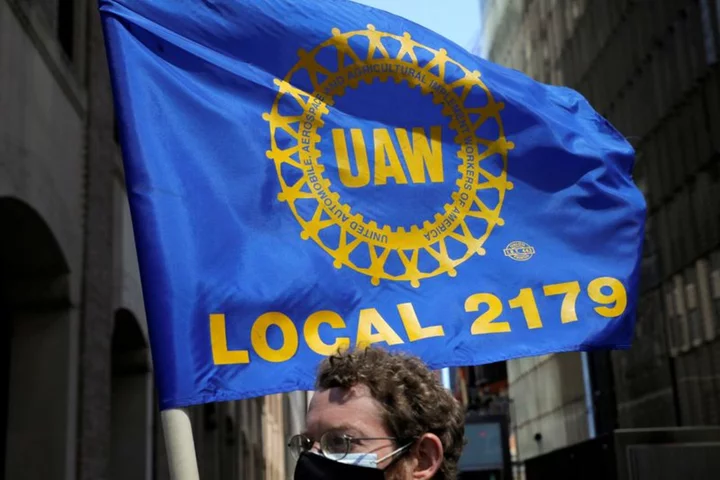The United Auto Workers (UAW) union expects to go on strike against the Detroit Three automakers on Thursday if no agreement is reached over new contracts in what would be the first-ever coordinated labor action against the companies.
The current contracts at General Motors, Ford Motor and Chrysler parent Stellantis are set to expire at 11:59 p.m. ET on Thursday.
Detroit automakers, like their global counterparts, have been focused on cost reductions, which in some cases include job cuts, to help accelerate a shift to electric vehicles (EVs) from gasoline-powered vehicles.
WHO IS THE UNION NEGOTIATING WITH?
The UAW, which represents 46,000 GM workers, 57,000 Ford employees and 43,000 Stellantis workers, kicked off negotiations with the companies in July.
The UAW has historically picked one of the Detroit Three to negotiate with first as the so-called target that sets the pattern on which subsequent deals are based. This time, UAW President Shawn Fain targeted all three companies simultaneously.
Contract talks between the UAW and the Detroit automakers have gone on until the strike deadline and beyond in past years.
WHAT ARE THE CURRENT OFFERS FROM THE DETROIT THREE?
Ford Motor has proposed a 20% hike in pay over the contract term, General Motors 18%, and Stellantis 17.5%, Fain said. That is less than half the pay hikes the union has sought, but higher than the companies' initial offers.
Ford CEO Jim Farley said in a letter to employees seen by Reuters: "bargaining is a two-way street and we continue to implore the UAW to stay at the table, work together to reach an agreement, and avert a strike."
WHAT DOES THE UAW HAVE TO SAY ABOUT THE OFFERS?
The union has rejected all the three offers. It is asking for 40% raises and major improvements in benefits.
"To win, we're likely going to have to take action," UAW Fain said on Wednesday. He reiterated that there would be a strike at all the three automakers if no agreement is reached before the deadline.
WHAT ARE THE UNION'S DEMANDS?
The UAW is pushing automakers to eliminate the two-tier wage system under which new hires earn as much as 25% less than veterans.
Fain has said repeatedly the union will push to restore pay improvements tied to the cost of living and retiree benefits cut during the 2008-2009 economic crisis.
The UAW also wants strong salary increases given the financial success of the automakers, citing generous executive payouts and large U.S. federal subsidies for EV sales.
The union also wants defined benefit pensions for all workers restored, 32-hour work weeks and additional cost-of-living hikes, job security guarantees and an end to the use of temporary workers.
Fain also is aiming to get agreements that would allow the UAW to represent hourly workers at joint-venture EV battery plants opened or planned by the Detroit Three.
The UAW has been wary of the industry shift to EVs and called on the Biden administration to soften its proposed vehicle emission cuts that would require 67% of new vehicles to be electric by 2032.
EVs require fewer parts to build and industry officials have said that will result in a need for fewer workers. Fain has said there should be no jobs lost because of the EV shift.
WHAT DO AUTOMAKERS WANT?
The Detroit Three want to close the cost gap they have with foreign automakers with non-unionized U.S. factories.
Ford sources estimate that their U.S. labor costs are $64 an hour, compared with an estimated $55 for foreign automakers and $45 to $50 for EV leader Tesla.
The companies also want greater flexibility in how it uses its U.S. workers to increase efficiency and cut costs as the industry shifts to EVs.
WHAT IS AT STAKE?
A strike would hit at a time when automakers are ramping up efforts to maximize gasoline and EV vehicle production to capitalize on demand for new vehicles.
A full strike would hit earnings at each affected automaker by about $400 million to $500 million per week assuming all production was lost, Deutsche Bank has estimated. Some losses could be recouped by boosting production schedules later, but that possibility fades if a strike extends to weeks or months.
In fiscal 2019, GM's fourth-quarter profit took a $3.6 billion hit from a 40-day UAW strike.
A potential strike could also trickle down and squeeze quarterly profits for auto part suppliers such as Aptiv, Lear Corp and Magna.
A 10-day strike by the UAW could cost manufacturers, workers, suppliers and dealers more than $5 billion, according to an analysis by the Anderson Economic Group, an economic consulting firm.
HOW WIDESPREAD WOULD A STRIKE BE?
It is unclear just how many workers would walk off the job in the event of a strike. Fain said the plan would be for a series of work stoppages targeting individual U.S. plants if no deal is reached.
Stopping work at a key engine or transmission plant, for example, could have a cascading effect by depriving other factories of parts they need to produce vehicles. Another option would be to strike at profitable pickup truck or SUV assembly plants.
(Reporting By Nathan Gomes in Bengaluru; Editing by Sriraj Kalluvila)









